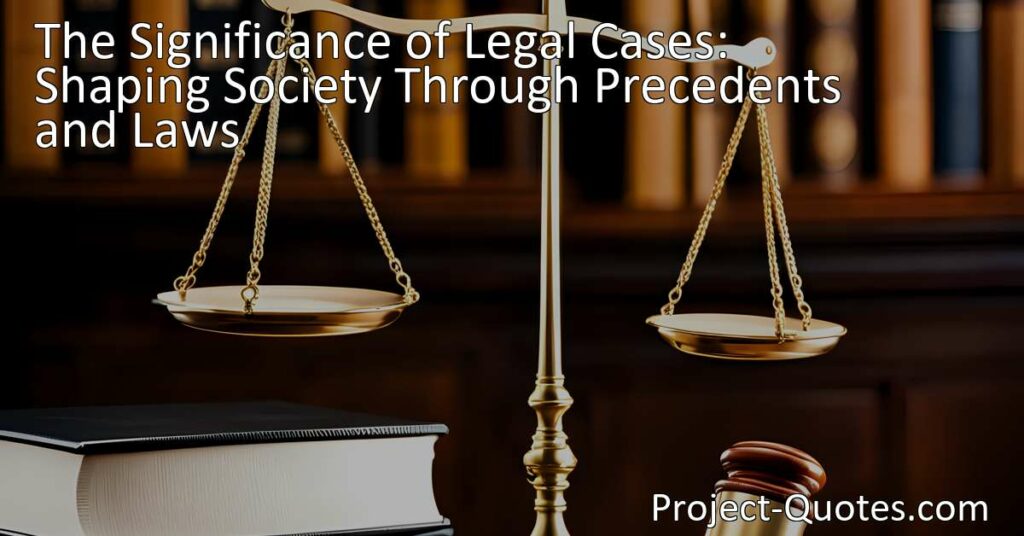I think that it is important for people to understand that whether a good-guy or a bad-guy wins a case is less important than what the law is that the case results in.
Floyd Abrams
The significance of legal cases lies in their ability to shape our society through the precedents and laws they establish. It is not just about who wins or loses, but about the broader impact on our legal system and the principles of justice and equality. These cases provide opportunities for public discourse and engagement, sparking debates that are essential for a healthy democracy.
Table of Contents
- 1 I think that it is important for people to understand that whether a good-guy or a bad-guy wins a case is less important than what the law is that the case results in.
- 2 Floyd Abrams
- 3 Meaning of Quote – I think that it is important for people to understand that whether a good-guy or a bad-guy wins a case is less important than what the law is that the case results in.
- 4 Freely Shareable Quote Image
- 5 Related
Meaning of Quote – I think that it is important for people to understand that whether a good-guy or a bad-guy wins a case is less important than what the law is that the case results in.
When it comes to legal battles, we often focus on the outcome of the case who wins and who loses. However, there is a crucial aspect that we tend to overlook in the midst of our fascination with the verdict: the impact of the law that emerges from the case. It is this law, after all, that sets the precedent for future decisions and shapes our society. In order to truly grasp the significance of a case, we must shift our attention from the individuals involved to the principles and rules that it establishes.
First and foremost, we need to understand that the law functions as the bedrock of a just society. It provides us with a framework to resolve conflicts, protect our rights, and establish a system of fairness. So, when a case is decided in the courtroom, the ultimate goal should be to ensure that justice is served and that the ruling supports the principles of equity and equality.
Whether a “good-guy” or a “bad-guy” prevails in a case might seem like the most important factor at first glance. We often get caught up in the stories portrayed in the media, cheering for one side to triumph over the other. However, this emphasis on individuals has the potential to blind us to the broader implications that each legal decision carries. It is not about the moral purity of the parties involved, but rather the larger consequences for society as a whole.
Furthermore, the lessons derived from legal cases go far beyond the immediate circumstances. Legal cases set precedents that guide future decisions and shape the direction of our legal system. They establish rules, interpretations, and principles that influence how similar cases will be handled in the future. In this way, they contribute to the evolution of the law, ensuring that it remains relevant and adaptive to our ever-changing society.
Consider, for example, the landmark Supreme Court case of Brown v. Board of Education. In this case, the court ruled that racial segregation in public schools was unconstitutional. The decision in favor of the plaintiffs was not just a victory for them, but a monumental step towards achieving racial equality in the United States. It shattered the notion of “separate but equal” and set a precedent that challenged segregation laws across the country. The significance of this case lies not only in who won or lost, but in the lasting impact it had on civil rights and the progress towards social justice.
Similarly, the outcome of the case can sometimes be misleading or insufficient when it comes to assessing its overall importance. In fact, there have been instances where a “bad-guy” wins a case, but the resulting law acts as a necessary wake-up call or catalyst for change. For instance, the infamous Plessy v. Ferguson case in 1896 upheld racial segregation laws and established the doctrine of “separate but equal.” While this ruling was undoubtedly unjust and detrimental to equality, it later played a crucial role in fueling the Civil Rights Movement. It exposed the inherent inequality and hypocrisy of segregation, leading to the eventual overturning of Plessy v. Ferguson by Brown v. Board of Education nearly six decades later.
By focusing solely on the individuals involved and the immediate outcome, we risk losing sight of the bigger picture. It is vital to remember that these cases are not isolated incidents but building blocks of our legal system. They contribute to the body of jurisprudence which guides judges, advocates, and citizens in future legal battles. Each case serves as an opportunity to refine, redefine, and reinforce the principles that underpin our society.
Moreover, these cases provide invaluable opportunities for public discourse and engagement with the law. They capture the attention of the media and the general public, sparking debates about justice, equality, and the role of the legal system. Such discussions are essential for a healthy democracy, as they encourage individuals to think critically about their rights, responsibilities, and the values they hold dear.
In conclusion, while it is natural to be drawn to the drama and intrigue of legal cases, we must not lose sight of the larger significance they hold. The outcome of a case is important, but it is the resulting law that carries the most weight in shaping our society. Whether a “good-guy” or a “bad-guy” prevails should not solely define the worth of a case. Instead, we should focus on how the law resulting from the case promotes justice, equality, and the well-being of our communities. By doing so, we ensure that our legal system evolves in a direction that aligns with the principles we hold dear.
I hope this quote inspired image brings you hope and peace. Share it with someone who needs it today!


